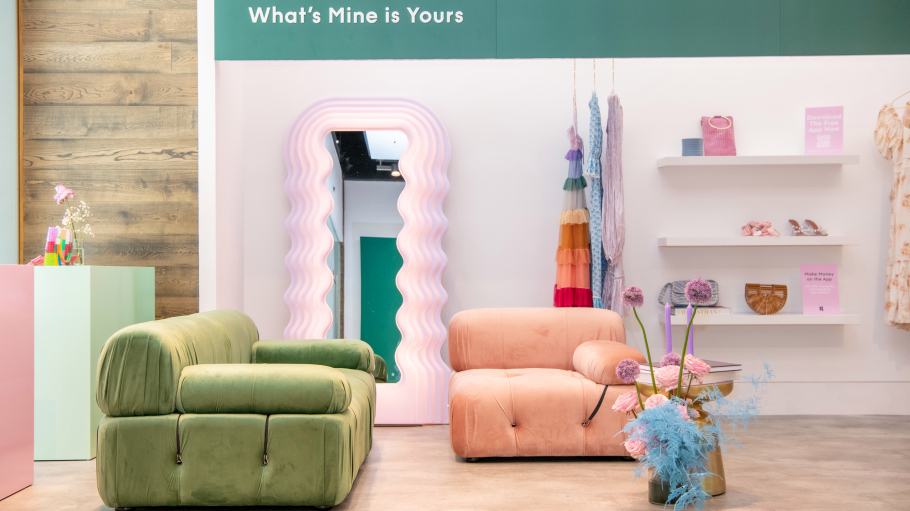LONDON — The pandemic has pushed many brands and retailers to shutter their shops, so much so that there are one too many empty windows spotted across most major retail hubs around the world.
Landlords are eager for new businesses to fill up the space and breathe life back into shopping streets — and it looks like the businesses that are in a position to afford the investment aren’t the usual luxury labels or traditional multibrand boutiques, but the new generation of rental start-ups and secondhand resellers.
To date, these businesses have adopted a tech-first approach and managed to weather the storm of the lockdowns by staying agile, keeping overheads at a minimum and pouring their efforts into building online communities and leveraging the momentum around sustainable consumption.
This translated into impressive growth figures across the board and a queue of investors at their doorsteps, so opening up physical stores was suddenly in the cards.
This summer in London alone, peer-to-peer rental platform By Rotation hosted a pop-up shop in Westfield, which was extended due to popularity; rental start-up Hurr took up a permanent space in Selfridges; Rotaro, another circular platform, popped up on a prime spot on Carnaby Street, and Harvey Nichols launched new in-store resale services with the consignment platform Reflaunt.
The influx of secondhand and rental store openings was, in many ways, exactly what the physical retail scene needed: Young blood, Instagrammable interiors, new price points and new consumption models for new-age shoppers.
But even if these labels can afford to create physical iterations of their brands, is it worth the investment when their audiences are primarily digitally savvy Millennials and Gen Zers?
For established names like Rent the Runway, building a store network didn’t end up making sense and with the lockdown being the final straw, the company revealed plans to permanently close all of its physical locations.
But for these start-ups, there’s still value in having a smaller number of strategic physical locations if they’re going to accomplish their mission of mainstreaming the circular revolution and providing everyone with a sustainable alternative to fast fashion.
“Our physical brick-and-mortar presence in Selfridges is more important than ever to win over first-time renters, giving shoppers the ability to interact with the concept of rental and get to know the Hurr brand,” said Victoria Prew, cofounder and chief executive officer of Hurr, adding that the visibility Selfridges offers has meant the company has had access to an older audience, like mothers-of-the-bride looking for a one-off occasion dress. “For real change to occur, rental has to be accessible to everyone and a physical store is an important part of this process.”
Hurr, which recently dressed British First Lady Carrie Johnson, is already expanding its footprint with a temporary setup at Selfridges’ Manchester outpost and plans to “reactivate [its] U.K. customer base over the coming months,” the company noted.
Others remain a little more skeptical, and don’t see physical retail as a key pillar of their strategies, but rather a brand-building exercise that should only exist in temporary formats.
By Rotation’s Eshita Kabra-Davies decided to accept Westfield’s invitation as a “brand-building and data-gathering exercise,” but remains focused on investing in technology and enhancing the app experience — particularly as rental volumes increased 20 times since April when lockdowns started lifting in the U.K.
“Our focus will remain on tech, complemented by community experiences such as events and workshops, that go beyond fashion,” said Kabra-Davies, adding that the experience reaffirmed how digitally savvy the By Rotation audience is because they “know what they like” and gravitated toward the same pieces they usually do on the app.
“We have been approached by various others for future pop-ups and we will continue to create them as spaces for the community to meet up and hang out at,” Kabra-Davies said. “It’s less about the transactional exchange and more about a relaxed space that allows you the ability to experiment, meet people and let your hair loose. Customers especially loved how different our pop-up looked to all other stores in the mall: No mannequins, beautiful interiors, art and books unrelated to fashion, plus no pressure for them to shop. This created goodwill and a love for By Rotation and what we stand for.”
Rotaro’s CEO Georgie Hyatt echoed her thoughts, calling the platform’s Carnaby Street pop-up “a physical manifestation of the Rotaro values.”
Unlike traditional retailers, these companies see the brick-and-mortar business as an opportunity to educate shoppers around circularity — for instance, Rotaro hosted upcycling workshops and shared key environmental stats throughout its space — and nurturing their communities.
“We used the space as an educational, inspirational and collaborative space to demonstrate the value of fashion rental to our community. It was a brilliant brand awareness exercise and customer acquisition channel, engaging many that had never heard of fashion rental before and demonstrating that fashion rental with Rotaro is really seamless and sustainable,” said Hyatt, also pointing to the gong baths, meditation sessions, styling workshops with Airbnb, and panel talks that all took place during the pop-up.
Even bigger players like Vestiaire Collective, which operates a small space in Selfridges, are staying focused on the digital-first model. The company has no plans to expand its physical footprint in a big way.
“Our business model has been digital from the start. It paid off during the 2009 recession and once again in 2020, as it facilitated an income for those who needed it,” a company spokesperson said. “Physical retail allows the possibility to see products in person and have the marvel of touch and feel, but the benefits of digital go from achieving a catalogue of 3 million items and 550,000 new pieces listed each month to having a worldwide wardrobe and accessibility to a global community, part of which might not have access to specific physical retail stores.”

